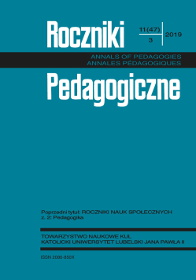The Reversal of the Flynn Effect and Its Reflection in the Educational Arena: Data Comparison and Possible Directions for Future Research and Action
Main Article Content
Abstrakt
Odwrócenie efektu Flynna i jego odbicie w edukacji: porównanie danych i możliwe kierunki dla przyszłych badań i działań
Przez lata wskaźniki zdolności poznawczych i kompetencji akademickich sugerowały, że zdolność ludzi do skutecznego radzenia sobie z otoczeniem ulega poprawie (nazwanej efektem Flynna). Ostatnie dowody sugerują, że ten trend może się zmieniać. To badanie analizuje dane uzyskane z Programu Międzynarodowej Oceny Uczniów (Program for International Student Assessment ) dla celowej próby grupy 9 krajów w ciągu ostatnich 6 lat i sugeruje, że rzeczywiście istnieją dowody na znaczny spadek kompetencji uczniów i umiejętności czytania, pisania i matematyki poza możliwymi względami ekonomicznymi i czynnikami krajowymi. Omówiono znaczenie wyników dla edukacji i jego potencjalne implikacje.
Article Details
Bibliografia
Bandura, A. (1998). Personal and collective efficacy in human adaptation and change. Advances in psychological science, 1, 51–71.
Barshay, J. (2017). Third indication U.S. educational system is deteriorating. The Hechinger Report, December, 11, Retrieved from: https://hechingerreport.org/third-indication-u-s-educational-system-deteriorating/.
Bennett, J.W. (2017). The ecological transition: cultural anthropology and human adaptation. London: Routledge.
Bratsberg, B., & Rogeberg, O. (2018). Flynn effect and its reversal are both environmentally caused. Proceedings of the National Academy of Sciences, 115(26), 6674–6678.
Byrne, D.M.; Oliner, S.D.; Sichel, D.E. (March 2013). Is the Information Technology Revolution Over? (PDF). Finance and Economics Discussion Series Divisions of Research & Statistics and Monetary Affairs Federal Reserve Board. Washington, D.C.: Federal Reserve Board Finance and Economics Discussion Series (FEDS).
Coburn, C.E., & Penuel, W.R. (2016). Research–practice partnerships in education: Outcomes, dynamics, and open questions. Educational Researcher, 45(1), 48–54.
Deudney, D. (2018). Turbo Change: Accelerating Technological Disruption, Planetary Geopolitics, and Architectonic Metaphors. International Studies Review, 20(2), 223–231.
Dieterich, D.J. (1977). The Decline in Student’s Writing Skills: An ERIC/RCS Interview. College English, 38(5), 466–472.
Dockrill, P. (2018). IQ Scores Are Falling in “Worrying” Reversal of 20th Century Intelligence Boom. Science Alert, Jan, 13th. Retrieved from: https://www.sciencealert.com/iq-scores-falling-in-worrying-reversal-20th-century-intelligence-boom-flynn-effect-intelligence.
Flynn, J.R. (1984). The mean IQ of Americans: Massive gains 1932 to 1978. Psychological Bulletin, 95(1), 29–51.
Kaufman, A.S., Kaufman, J.C., Liu, X., & Johnson, C.K. (2009). How do educational attainment and gender relate to fluid intelligence, crystallized intelligence, and academic skills at ages 22–90 years? Archives of Clinical Neuropsychology, 24(2), 153–163.
Kershaw, A. (2010). Big drop in Math skills for entering students. University Affairs, ept. 13th, Retrieved from: https://www.universityaffairs.ca/news/news-article/big-drop-in-math-skills-of-entering-students/.
Lockie, S. (2017). Post-truth politics and the social sciences. Environmental Sociology, 3(1), 1–5.
Meroni, E.C., Vera-Toscano, E., & Costa, P. (2015). Can low skill teachers make good students? Empirical evidence from PIAAC and PISA. Journal of Policy Modeling, 37(2), 308–323.
Nevo, B. (2000). Human Intelligence (Part 1). Tel Aviv: The open University Press.
Obrien, C. (2019). Student literacy levels: ‘It is almost as if they are word blind.’ The Irish Times, Feb., 25th. Retrieved from: https://www.irishtimes.com/news/education/student-literacy-levels-it-is-almost-as-if-they-are-word-blind-1.3803913.
OECD (2015). PISA 2015 results in focus. OECD press.
Rocconi, L.M., & Ethington, C.A. (2009). Assessing longitudinal change: adjustment for regression to the mean effects. Research in Higher Education, 50(4), 368–376.
Schreiber, J.B., & Chambers, E.A. (2003). American high school seniors’ mathematics literacy achievement. North American Journal of Psychology, 5(1), 15–30.
Stillman, J. (2019). Good News from Science: Humanity Might Not Be Getting Dumber After All. Retrieved from: https://www.inc.com/jessica-stillman/humanity-might-not-be-getting-dumber-after-all-new-study-suggests.html.
Sparks, S. (2017). Global Reading Scores Are Rising, But Not for U.S. Students. Education Week, Dec., 5th, Retrieved from: https://www.edweek.org/ew/articles/2017/12/05/global-reading-scores-are-rising-but-not.html.
Torgesen, J.K., Houston, D.D., Rissman, L.M., Decker, S.M., et al. (2017). Academic Literacy Instruction for Adolescents: A Guidance Document from the Center on Instruction. Center on Instruction.
Vyas, K. (2019). Are We Really Getting Dumber as Devices Get Smarter? Interesting Engineering, July, 20th. Retrieved from: https://interestingengineering.com/are-we-really-getting-dumber-as-devices-get-smarter.
Waldrop, M.M. (2016). The chips are down for Moore’s law. Nature News, 530(7589), 144.
World statistics (2019). World Statistics, 2018. Retrieved from: https://world-statistics.org/.
Zysberg, L. (2018). Information overload and the rise of the post-fact era: on the way to some educational insights. Dvarim (Overload), 159–180 (Hebrew).

